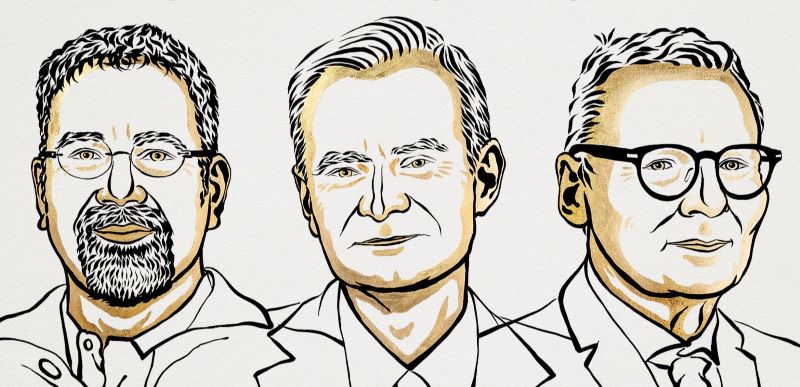 Nobel Prize
Nobel Prize
Nobel Prize in economic sciences awarded to Daron Acemoglu, Simon Johnson and James A. Robinson
Three economists have been awarded the Nobel Prize for their studies of 'how institutions are formed and affect prosperity'.
Daron Acemoglu, Simon Johnson and James A. Robinson have been awarded the Nobel Prize, the Royal Swedish Academy of Sciences announced on Monday.
This year’s laureates in the economic sciences – Daron Acemoglu, Simon Johnson and James Robinson – have demonstrated the importance of societal institutions for a country’s prosperity. Societies with a poor rule of law and institutions that exploit the population do not generate growth or change for the better. The laureates’ research helps us understand why.
When Europeans colonised large parts of the globe, the institutions in those societies changed. This was sometimes dramatic, but did not occur in the same way everywhere. In some places the aim was to exploit the indigenous population and extract resources for the colonisers’ benefit. In others, the colonisers formed inclusive political and economic systems for the long-term benefit of European migrants.
The laureates have shown that one explanation for differences in countries’ prosperity is the societal institutions that were introduced during colonisation. Inclusive institutions were often introduced in countries that were poor when they were colonised, over time resulting in a generally prosperous population. This is an important reason for why former colonies that were once rich are now poor, and vice versa.
Some countries become trapped in a situation with extractive institutions and low economic growth. The introduction of inclusive institutions would create long-term benefits for everyone, but extractive institutions provide short-term gains for the people in power.
BREAKING NEWS
— The Nobel Prize (@NobelPrize) October 14, 2024
The Royal Swedish Academy of Sciences has decided to award the 2024 Sveriges Riksbank Prize in Economic Sciences in Memory of Alfred Nobel to Daron Acemoglu, Simon Johnson and James A. Robinson “for studies of how institutions are formed and affect prosperity.”… pic.twitter.com/tuwIIgk393
As long as the political system guarantees they will remain in control, no one will trust their promises of future economic reforms. According to the laureates, this is why no improvement occurs.
However, this inability to make credible promises of positive change can also explain why democratisation sometimes occurs. When there is a threat of revolution, the people in power face a dilemma. They would prefer to remain in power and try to placate the masses by promising economic reforms, but the population are unlikely to believe that they will not return to the old system as soon as the situation settles down. In the end, the only option may be to transfer power and establish democracy.
"Reducing the vast differences in income between countries is one of our time’s greatest challenges. The laureates have demonstrated the importance of societal institutions for achieving this," says Jakob Svensson, Chair of the Committee for the Prize in Economic Sciences.
Daron Acemoglu, born 1967 in Istanbul, Türkiye. PhD 1992 from London School of Economics and Political Science, UK. Professor at Massachusetts Institute of Technology, Cambridge, USA.
Simon Johnson, born 1963 in Sheffield, UK. PhD 1989 from Massachusetts Institute of Technology, Cambridge, USA. Professor at Massachusetts Institute of Technology, Cambridge, USA.
James A. Robinson, born 1960. PhD 1993 from Yale University, New Haven, CT, USA. Professor at University of Chicago, IL, USA.
Support Our Journalism
We cannot do without you.. your contribution supports unbiased journalism
IBNS is not driven by any ism- not wokeism, not racism, not skewed secularism, not hyper right-wing or left liberal ideals, nor by any hardline religious beliefs or hyper nationalism. We want to serve you good old objective news, as they are. We do not judge or preach. We let people decide for themselves. We only try to present factual and well-sourced news.







